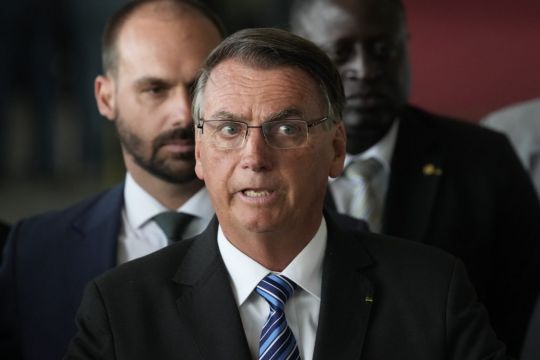Thousands of Brazilian president Jair Bolsonaro’s supporters have called on the military to keep the far-right leader in power, even as his administration signalled a willingness to hand over the reins to leftist rival Luiz Inacio Lula da Silva.
The president’s supporters gathered in the rain outside the Eastern Military Command in Rio de Janeiro, one of the army’s eight regional headquarters, many of them raising clenched fists in the air as they brandished Brazilian flags and sang the national anthem.
Some chanted, “Armed forces, save Brazil!” and “United, the people will never be defeated!”

Meanwhile, truck drivers who for days have maintained roadblocks across the country to protest Mr Bolsonaro’s defeat were still out in force, despite a Supreme Court order to dismantle them.
The protests came amid international recognition of Mr da Silva’s victory and a recommendation from the Brazilian Supreme Court that Mr Bolsonaro accept the results of Sunday’s election. Cabinet members, governors-elect and evangelical leaders who have been strident supporters of Mr Bolsonaro are now offering overtures to the incoming leftist government.
The military has taken on an ample role under Mr Bolsonaro, but has remained silent in the month since the first round of the election, a sign it is likely distancing itself from the ex-army captain, experts said.
“In a democracy, the armed forces do not have a say in the electoral process,” said Eduardo Munhoz Svartman, president of the Brazilian Association for Defence Studies. “This silence is desirable.”
Mr Bolsonaro lost to Mr da Silva in a nail-biting contest, garnering 49.1 per cent of the vote to da Silva’s 50.9 per cent. It was the tightest presidential race since Brazil’s return to democracy in 1985, and marks the first time Mr Bolsonaro has lost an election in his 34-year political career.
The outgoing president took nearly two days to address the nation, and there had been speculation that he might fight the result after repeatedly questioning the reliability of the country’s electoral system before the election.

In a speech at the presidential residence lasting less than two minutes on Tuesday, he stopped short of conceding to Mr da Silva, but said he would continue to obey the constitution. He also encouraged protests by his supporters, as long as they remained peaceful.
Immediately afterward, his chief of staff told reporters Mr Bolsonaro had authorised him to begin the process of handing over power, while later in the day the president reportedly told members of the Supreme Court that his election battle against Mr da Silva had come to an end.
“It is over. So, let’s look ahead,” he said, according to Supreme Court Justice Luiz Edson Fachin, who met privately with the conservative leader. Mr Fachin made his remarks in a video broadcast by Brazilian news outlets.
Much like former US president Donald Trump, whom Mr Bolsonaro openly admires, he has claimed that electronic voting machines are prone to fraud. He has not provided any proof, even when ordered to do so by the electoral court.
Many of his supporters are also questioning the results, and truckers who back the president have erected hundreds of blockades around the country to protest the election’s outcome. On Wednesday morning, highway police said that they had removed 630 blockades, with more than 150 still in place.
At one roadblock in Sao Paulo state on Tuesday, protesters set tyres on fire. Huge lines of cars could be seen snaking along the highway. In Itaborai, a region in Rio de Janeiro state, reporters saw truck drivers kneeling in front of police officers and refusing to evacuate.
Sao Paulo governor Rodrigo Garcia said on Tuesday that the time for negotiations was over, and he was not ruling out the use of force to dismantle the barriers.
But Bolsonaro supporters continued to resist. Users on social media, including in multiple Telegram and WhatsApp chat groups, shared demands that the military take the streets, or that Congress and the Supreme Court be disbanded and the president remain in office.







